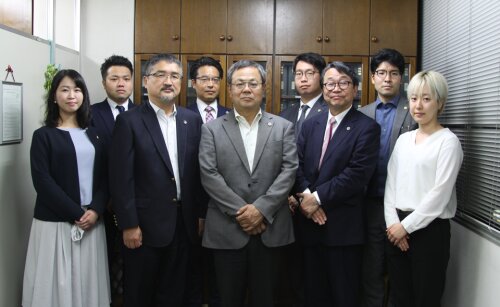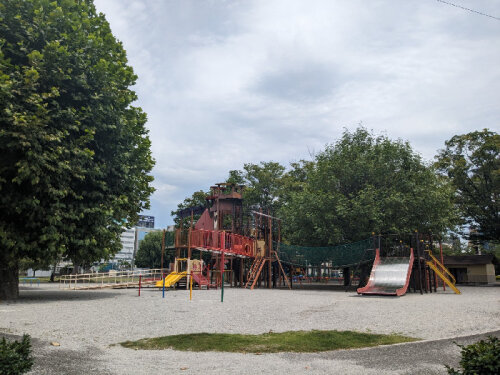Best Child Custody Lawyers in Shizuoka
Share your needs with us, get contacted by law firms.
Free. Takes 2 min.
Free Guide to Hiring a Family Lawyer
List of the best lawyers in Shizuoka, Japan
About Child Custody Law in Shizuoka, Japan
Child custody in Shizuoka is governed by the same national laws that apply throughout Japan. When parents separate or divorce, child custody refers to who has the legal authority and responsibility for a child - including decision-making, daily care, and living arrangements. In Japan, after a divorce the law effectively recognizes only single custody - meaning one parent is generally designated the custodial parent for the purposes of registration and legal authority. Family courts and family divisions of district courts handle custody disputes, visitation arrangements, child support matters, and related provisional measures. Local practice in Shizuoka will follow national law, while the Shizuoka Family Court and its branch offices handle cases arising in the prefecture.
Why You May Need a Lawyer
Child custody cases can be emotionally charged and legally complex. You may need a lawyer if you are dealing with any of the following situations:
- You and the other parent cannot agree on who will have custody or how visits will be arranged.
- You need to obtain or contest child support calculations and enforcement.
- There are allegations of abuse, neglect, domestic violence, or substance misuse that affect the child-s safety.
- You are concerned about international relocation or possible international parental child abduction.
- The other parent is withholding the child, has moved without agreement, or refuses court-ordered visitation.
- You need provisional or emergency measures - for example temporary custody or protection orders - while a longer court process is pending.
- You require help gathering and presenting evidence like income documents, school records, communication logs, or professional assessments.
- You are navigating mediation or family court proceedings for the first time and need advice on procedure, likely outcomes, and settlement options.
A lawyer experienced in family law can explain legal options, prepare filings, represent you in negotiation and court, and help protect your parental rights and your child- s welfare.
Local Laws Overview
Key legal points relevant to child custody in Shizuoka and across Japan include:
- Sole custody after divorce: Under Japanese practice and the Civil Code, after divorce legal parental authority is usually assigned to a single parent. Joint custody as a formal legal status is not generally recognized after a divorce in Japan.
- Family court role: The family division of the district court resolves disputes about custody, visitation, and child support. Courts encourage mediation and conciliation, but will make binding decisions if parties cannot agree.
- Visitation and contact: Courts can order visitation schedules or contact arrangements. However, enforcement of visitation orders can be difficult and often requires further court action if the non-custodial parent s access is blocked.
- Child support obligations: Both parents remain financially responsible for their child. Child support amounts are typically based on income and guideline tables used by courts, and can be enforced through family or civil procedures.
- Provisional measures: The family court can grant temporary or provisional orders - for example temporary custody, restrictions on moving a child, or other protections - while the main dispute is pending.
- International issues: Japan is a contracting state to the Hague Convention on the Civil Aspects of International Child Abduction. International relocation and cross-border disputes raise additional procedures and involvement from central authorities.
- Administrative records: The Japanese family register system - koseki - and residence records - juminhyo - are important documents in custody and guardianship matters. Be prepared to produce official records when required.
Frequently Asked Questions
Can parents in Japan share legal custody after divorce?
Formally sharing legal custody after divorce is generally not the standard practice in Japan. The family court typically designates one parent as the custodial parent for legal purposes. Parents can, however, make private agreements about joint parenting and decision-making, but such agreements are not the same as a legally recognized joint custody status after divorce.
How is custody decided if parents cannot agree?
If parents cannot agree, the family court will decide based on the child's best interests. The court considers factors such as each parent- s ability to care for the child, the child- s relationship with each parent, living conditions, stability, and any reports from social services or experts. The court may also order mediation or conciliation as a first step.
What can I do if the other parent refuses visitation?
If visitation is refused, you can request that the family court determine a visitation schedule or issue orders enforcing contact. Enforcement can be challenging and may require further legal steps. A lawyer can advise on options like seeking court-ordered visitation, enforcement actions, or requesting provisional measures if necessary.
Can I take my child out of Shizuoka or out of Japan without the other parent- s permission?
Relocating a child, especially internationally, is legally sensitive. Removing a child from the prefecture or from Japan without the custodial parent- s consent can lead to legal consequences, including accusations of parental abduction. If you plan to relocate, obtain a legal agreement or court order that addresses relocation and the other parent- s contact rights before moving.
How is child support calculated and enforced?
Child support is normally calculated using guideline tables that consider both parents- incomes, the number of children, and custody arrangements. If the paying parent fails to make payments, the recipient can pursue enforcement through family court or civil procedures, including wage garnishment. A lawyer can help calculate appropriate amounts and take enforcement steps.
Are emergency or temporary custody orders available?
Yes. The family court can issue provisional or temporary orders to protect the child- s welfare while a case is pending. These orders might cover temporary custody, restrictions on travel, or protective measures in cases of domestic violence. Quick action and legal advice are important to obtain temporary protection when a child is at risk.
What role does mediation play in custody disputes?
Mediation and conciliation are commonly used to resolve custody and divorce issues. Courts often require or encourage mediation before making a final ruling. Mediation can be faster, less adversarial, and less expensive than litigation, but both parties must be willing to negotiate in good faith for mediation to succeed.
Can foreign residents in Shizuoka get custody rights?
Yes. Foreign residents have the same legal rights and obligations regarding custody and visitation as Japanese nationals. Language barriers, immigration status, and international law issues can complicate matters, so foreign parents should consider a lawyer who understands international family law and, if needed, can provide translation or work with interpreters.
What documents should I prepare for a custody case?
Useful documents include the child- s birth certificate, documents from the family register (koseki), residence certificate (juminhyo), proof of income and tax records, school and health records, evidence of daily caregiving, communication records with the other parent, incident reports if relevant, and any prior agreements or court orders. Organizing these documents early helps your lawyer assess the case and prepare filings.
How long does a custody dispute usually take to resolve?
Timelines vary widely. Mediation can resolve some cases in weeks or months. Contested cases that go to a full family court hearing can take many months to over a year, depending on complexity, need for expert evaluations, and court schedules. Emergency or provisional orders can often be obtained faster to address immediate risks.
Additional Resources
When seeking legal help in Shizuoka, consider these types of local and national resources:
- The family division of the district court that serves Shizuoka Prefecture for filing custody matters and mediation.
- Shizuoka Bar Association for lawyer referrals and lists of family law specialists.
- Japan Legal Support Center - Houterasu - for information about legal aid and how to access subsidized legal services.
- Municipal child consultation centers - often called children- s consultation centers or kodomo sodanjo - for child welfare concerns and assessments.
- Local municipal welfare and family support services for counseling, parenting support, and social services.
- Police and emergency services when immediate protection is needed, for example in cases of violence or abduction.
- If international issues are involved, the central authority responsible for Hague Convention cases and the Ministry of Foreign Affairs for consular assistance and guidance.
Next Steps
If you need legal assistance for a child custody matter in Shizuoka, follow these steps:
- Gather key documents: child- s birth certificate, koseki or family registration information, residence records, income proof, correspondence with the other parent, and any records of abuse or neglect.
- Contact a family law lawyer or seek a referral from the Shizuoka Bar Association. If cost is a concern, contact Houterasu to learn about legal aid options.
- Consider mediation as a first option if it is safe and both parties are willing. Mediation can be faster and less adversarial than court litigation.
- If a child is at immediate risk, seek provisional court orders or contact the police and child consultation services right away.
- If the case involves cross-border issues, notify the appropriate central authority and get legal advice that covers international law and the Hague Convention rules.
- Keep detailed records of communications, visitation attempts, expenses for the child, and any incidents that affect the child- s welfare.
- Ask your lawyer about realistic timelines, costs, and possible outcomes so you can make informed choices at each stage.
Child custody cases are emotionally difficult and often legally technical. Early legal advice and careful preparation can protect your rights and help secure the best interests of your child.
Lawzana helps you find the best lawyers and law firms in Shizuoka through a curated and pre-screened list of qualified legal professionals. Our platform offers rankings and detailed profiles of attorneys and law firms, allowing you to compare based on practice areas, including Child Custody, experience, and client feedback.
Each profile includes a description of the firm's areas of practice, client reviews, team members and partners, year of establishment, spoken languages, office locations, contact information, social media presence, and any published articles or resources. Most firms on our platform speak English and are experienced in both local and international legal matters.
Get a quote from top-rated law firms in Shizuoka, Japan — quickly, securely, and without unnecessary hassle.
Disclaimer:
The information provided on this page is for general informational purposes only and does not constitute legal advice. While we strive to ensure the accuracy and relevance of the content, legal information may change over time, and interpretations of the law can vary. You should always consult with a qualified legal professional for advice specific to your situation.
We disclaim all liability for actions taken or not taken based on the content of this page. If you believe any information is incorrect or outdated, please contact us, and we will review and update it where appropriate.









